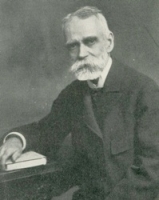Samuel Swett Green: 1837 - 1918
 Samuel Swett Green, the Second Head Librarian of the Worcester Public Library, was born in Worcester in 1837, the son of James Green and the nephew of Dr. John Green, III, the founder of the Worcester Public Library. He received numerous degrees from Harvard University, including a Bachelor's Degree in 1858, a Divinity Degree in 1864 and a Master's of Art in 1870. His poor health and short stature kept him out of the Civil War. Green worked for the Mechanics National Bank of Worcester until 1871, when he was offered the position of Librarian of the Free Public Library of Worcester. He served in that position until 1909. He had previously served as a Director since the Library’s founding in 1859.
Samuel Swett Green, the Second Head Librarian of the Worcester Public Library, was born in Worcester in 1837, the son of James Green and the nephew of Dr. John Green, III, the founder of the Worcester Public Library. He received numerous degrees from Harvard University, including a Bachelor's Degree in 1858, a Divinity Degree in 1864 and a Master's of Art in 1870. His poor health and short stature kept him out of the Civil War. Green worked for the Mechanics National Bank of Worcester until 1871, when he was offered the position of Librarian of the Free Public Library of Worcester. He served in that position until 1909. He had previously served as a Director since the Library’s founding in 1859.
“His purpose has been from the first to make the Public Library an instrument for popular education and a practical power in the community. To this end he has written and spoken much during the past twenty years and his efforts and advice has influenced, in no slight degree, library methods and administration throughout the United States.”
He maintained his interest in the arts throughout his life and was a member of a committee which consulted with Stephen Salisbury on the creation of the Worcester Art Museum. He held offices in the Worcester Art Society, Worcester Public Schools Art League and “has been very influential in promoting interest in the fine arts in Worcester, by offering exhibits in the Public Library building, and by the installation in the library of a large collection of the best photographs of old and more modern masterpieces in painting and sculpture.”
Samuel Swett Green wrote many articles on library topics, which formed the basis for the emerging field of public librarianship in this country and abroad. His concepts were studied in France, Germany, Denmark and Great Britain. Some of his writings were published as books, others appeared as papers in various journals and many were appended to the Annual Reports of the Worcester Public Library. He focused many of his writings on libraries and schools, sharing resources, as well as serving different populations, including children and the working class.
Under Samuel Swett Green’s leadership, the Worcester Public Library:
- Became noted for its pioneering public service orientation, including reference assistance to school children and factory workers,
- Was the first public library in the U.S. to open on Sundays (1872),
- Established a lending collection of artwork,
- Instituted interlibrary loans, and
- Advocated the use of the telephone in libraries as early as 1880.
Samuel Swett Green authored two books, Library Aids and Libraries and Schools, both still available online, as well as numerous other publications including:
- Use of Pictures in Public Libraries of Massachusetts,
- Relations of Public Library to the Public Schools,
- Sensational Fiction in Public Libraries,
- Interlibrary Loans in Reference Work,
- Library in its Relation to Persons Engaged in Industrial Pursuits,
- Opening Libraries on Sunday,
- Use of Libraries by Children,
- Use of Pictures in Libraries,
- What Classes of Persons, if any, Should Have Access to the Shelves of Large Libraries, and
- Discrimination Regarding ‘Open Shelves’ in Libraries.
Green, one of the founders of the American Library Association (ALA), is best know in the library field for the paper he delivered in 1876 at the Conference of Librarians in Philadelphia. Titled The Desirableness of Establishing Personal Intercourse and Relations Between Librarians and Readers, it formed the basis of modern library reference service, stating that, “librarians must acknowledge the presence of library users and interact with them by answering their questions.” Green also wrote the Public Library Movement in the United States, 1853 -1893 (1913) and taught at the School of Library Economy at Columbia University and the State Library of New York. He was a founding member of Massachusetts Library Club, now the Massachusetts Library Association (MLA).
After his death, Green was remembered for “his sympathy, geniality, versatility, patience, tact, energy, and wisdom in discharging his duties, for as he had said of himself, 'There are few pleasures comparable to that of associating continually with curious and vigorous young minds, and of aiding them to realize their ideals.'" His service ideals continue to influence modern library service.

